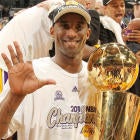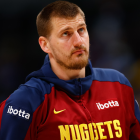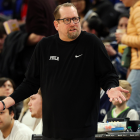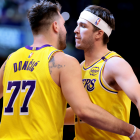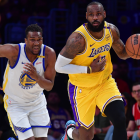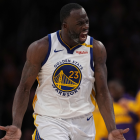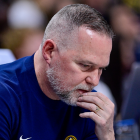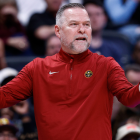In the wake of the shocking deaths of Kobe Bryant, his 13-year-old daughter, Gianna, and the seven other passengers that were on board the helicopter that crashed in Southern California Sunday morning, everyone has been trying to share all the good stories and memories they can muster about the NBA and Los Angeles Lakers legend.
Kobe is being remembered as a family man. A father. A friend and mentor. But above all else, Kobe Bryant, of course, will be remembered as one of the greatest basketball players to ever live. It was beautiful thing to watch him play -- that rare joy of witnessing someone do something they were clearly born to do.
Kobe and the game were perfect together. His list of memorable moments and performances are a proverbial mile long. Everyone's list is different. Memories are personal. To me, these are the 10 most iconic moments in Kobe's career.
June 26, 1996: Kobe becomes a Laker
Kobe, coming straight from high school, was selected No. 13 overall by the Charlotte Hornets, who then traded him to the Lakers in exchange for Vlade Divac. This, to me, is Kobe's most iconic moment, because without this, all the other moments we're about to talk about never would've happened -- at least not the way we remember them. The basketball butterfly effect runs too deep to even fathom.
To be sure, Kobe would've been an all-time great no matter where he played. The combination of his talent, drive and work ethic was an unstoppable force. But doing it with the Lakers, one of the most storied franchises in all of sports, is just different. This is Derek Jeter with the Yankees.
Of course, hindsight is always 20-20 when we look back at where so many great players were drafted and all the teams that now regret their decisions. But this one is even more interesting in that the Philadelphia 76ers had the No. 1 pick in 1996. Bryant was from Philly. He was a legend at Lower Merion High School. His dad, Joe "Jellybean" Bryant, played for the 76ers. The headlines would've written themselves.
Ultimately, the Sixers took Allen Iverson with the top pick, and it's hard to fault that decision. The Grizzlies taking Marcus Camby, the Bucks and Timberwolves swapping Stephon Marbury and Ray Allen, and the Celtics going with Antoine Walker are all at least understandable picks. But after that, well, there were some mistakes. Shareef Abdur-Rahim at No. 3. Lorenzen Wright at No. 7. Samaki Walker at No. 8. Erick Dampier at No. 10. Todd Fuller at No. 11. Vitale Potapenko at No. 12.
And Kobe Bryant at No. 13. Taken by Charlotte, traded to the Lakers, who shortly thereafter signed Shaquille O'Neal to pair with Bryant. And the rest is history.
May 12, 1997: The Airball Game
It was Game 5 of the Western Conference semifinals. Lakers at Jazz. Kobe is an 18-year-old rookie -- at the time the youngest player to ever start an NBA game -- and the ball is in his hands with the score tied 89-89 and the final 10 seconds of regulation ticking down. He gets to his spot at the elbow, plants and fires up ... an airball.
OK, it's one shot. The kid is 18 and playing leading man in the closing seconds of an NBA playoff game. Give him a break. It won't happen again. Except it did happen again. In fact, Kobe threw up three more airballs in the overtime period of this same game.
To this day, it's stunning that a player with the talent and confidence of Kobe Bryant could ever airball four shots in a five-minute period. But it happened. On a giant stage. And it could've crushed, for years to come, the confidence of a lot of young players.
Thing is, it probably never would've happened to a lot of young players in the first place because they wouldn't have had the guts to put up the second shot after the first airball, let alone the third and the fourth. They would've preserved their fragile confidence by shying away from the spotlight. But not Kobe. This guy wasn't just fearless. He attacked fear.
There's an old saying that before you can be you have to believe. Kobe believed he was the best basketball player on any floor he ever stepped on. He believed this even when he wasn't. This unwavering, jaw-clenched, world-conquering belief in himself served as the foundation of his team and individual success over the next 20 years. And it was all on display in one of the toughest five-minute stretches any 18-year-old athlete could ever endure.
June 3, 2000: The Shaq alley-oop
It was Kobe's fourth season in the league, and Phil Jackson's first with the Lakers, who were trailing the Portland Trail Blazers by 14 points going into the fourth quarter of Game 7 of the Western Conference finals. They mounted a comeback. With 55 seconds remaining, they had a four-point lead and the ball. There was still time for the Blazers to squeeze two more possessions, but they had to get a stop on this possession.
Bryant wouldn't let it happen. He crossed over Scottie Pippen at the top of the key, got into the lane, and delivered a high-arcing, pinpoint alley-oop to Shaq for arguably the most iconic play of his career, or certainly the most iconic assist.
Bryant went on to win the first of his five championships a few weeks later, defeating the Indiana Pacers 4-2 in the NBA Finals.
Jan. 22, 2006: The 81-point game
It came against the Raptors, and it was the second-highest single-game output in NBA history, trailing only Wilt Chamberlain's 100-point game in 1962. The numbers were staggering. To get to 81, Bryant shot over 60 percent from the field (28 for 46) and 90 percent from the free-throw line (18 for 20), so good luck making some ill-informed argument about Kobe gunning his way to this ridiculous output.
Want some more numbers? The next-highest-scoring Laker was Smush Parker with 13 points. The Toronto starters only scored 68 points combined. Kobe "only" scored 26 points in the first half, meaning he dropped FIFTY-FIVE in the final two quarters. Keep in mind, NBA basketball in 2006 was not being played at the same pace as it is today.
In fact, the league's collective pace was 90.5 possessions per 48 minutes in 2005-06, which is the fifth-slowest mark since the merger -- and the Lakers' 90.9 mark was just 15th in the league that season. This was the opposite of a run-and-gun team in a run-and-gun era. And Kobe still got 81 in a 122-104 Lakers victory.
There were other huge scoring nights for Kobe -- a string of which we'll get to shortly. In 2005, he put 62 points on the Mavericks in three quarters. In 2009, he scored 61 against the Knicks at Madison Square Garden, which at the time was the highest single-game output ever for a visiting player. All told, Kobe posted six 60-point games during the course of his career. He scored 50 or more points 26 times, and 40 or more 134 times.
But the 81-point game stands above them all. It was the definition of iconic.
April 30, 2006: Kobe sinks Suns
The 2005-06 season showcased the peak of Bryant's scoring powers. He averaged 35.4 points that season for the first of his two consecutive scoring titles. He had to score like this because the Lakers weren't a great team. The next-highest scorer was Lamar Odom at fewer than 15 points per game. After Bryant and Odom, a not-so-Big-3 of Smush Parker, Kwame Brown and Chris Mihm led the team in minutes. That Kobe got the Lakers to 45 wins and a No. 7 seed was a feat in itself.
It led to a first-round matchup with the heavily favored Phoenix Suns. The Lakers, pretty shockingly, led the series 2-1 going into Game 4, which went to overtime after Bryant finished a highly difficult teardrop from almost underneath the backboard to tie the game at the end of regulation. Then, in OT, he did this:
I remember watching this game, and when Kobe chased down that loose ball off the jump, I knew the game was over. I'm not just saying that now. I knew it then. I think pretty much everyone watching this game knew it. I vividly remember him making his way to his right-elbow spot, one of his many sweet spots, and when that shot got off clean, it was a wrap. No way Kobe Bryant was missing that shot in that situation. The Suns actually rallied from from a 3-1 deficit to win the series, but nobody remembers that. Everyone remembers Kobe's shot.
March 16-23, 2007: Four straight 50 pieces
With the Lakers having lost seven straight games, Kobe put his foot down by going on a scoring rampage over a week's time, posting at least 50 points in four consecutive games to join Wilt Chamberlain as the only players in NBA history to ever pull off such a feat. It started with a 65-point game against Portland, 24 of which came in the fourth quarter.
Two days later, Kobe scored 50 against the Timberwolves, then 60 against the Grizzlies and 50 against the Hornets. The Lakers won all four games. Kobe, who shot 54 percent from the field over this four-game stretch, saw his 50-point streak end when he scored a pedestrian 43 points in a win over the Warriors on March 25th. Any time a scoring streak ends with 43 points, and puts you in the company of Wilt Chamberlain, you've done something truly iconic.
Aug. 24, 2008: Kobe wins gold
After the Dream Team won gold in 1992, and the precedent had been set that the United States would now be fielding teams composed of cream-of-the-crop NBA players for subsequent Olympics and international competitions, gold medals became not just an expectation, but in most people's eyes, a formality.
That was the case for a while. Team USA won Olympic gold in 1996 and 2000. But then the luster of representing their country wore off for a lot of the top Americans. The best players started sitting out. Team USA was embarrassed at the 2004 Olympics, losing to Puerto Rico, Lithuania and Argentina en route to settling for a bronze medal. Then in 2006 they lost to Greece in the FIBA World Cup semifinals and again wound up with a bronze.
So the best players in the world said enough was enough. Dubbed the "Redeem Team," Kobe Bryant led a group that included superstars such as LeBron James, Dwyane Wade, Chris Paul, Carmelo Anthony, Chris Bosh and Jason Kidd into the 2008 Beijing Olympics.
They played Spain in the gold medal game, and they were in the fight. With eight minutes to play, it was a two-point game. That's when Kobe took over, scoring 13 points over those final eight minutes, with the weight of an entire country's basketball pride on his shoulders, to lead the United States back onto the Gold Medal podium.
On multiple occasions, Bryant referenced this victory as one of the most significant of his career. It was yet another illustration of his refuse-to-lose will.
April 12, 2013: The Achilles free throws
For a lesser competitor, this could've easily been the end: a torn Achilles in your 17th season when you've already been in slow decline and you're on a team with little chance of competing for championships in the near future. But in the immediate wake of it happening, Kobe showed that this injury was not going to get the best of him.
He knew the Achilles was torn the moment it happened. The Lakers called timeout, and probably every other player in the world would've gone straight to the locker room. But not Kobe. Instead, as a matter of pure pride, he limped back onto the court, shot and MADE two free throws, then limped back off the court under his own power, refusing help.
Kobe was a fabulously talented athlete, but his talent, somehow, paled next to his toughness, his stubbornness, his sheer refusal to be beaten by anything -- even his own body. Never was all this on greater display than in this moment.
Dec. 14, 2014: Kobe passes Jordan
He would periodically downplay it in the media, but there was no way to hide Kobe's pursuit of not just Michael Jordan's six championships, but his pretty universally recognized status as the greatest basketball player of all time, wasn't a consistent motivating factor in his career. He obviously modeled his game after Jordan. Seriously, just watch this and try not to get goose bumps.
Kobe was the closest thing to Jordan anyone has ever seen, or likely ever will see. Bryant fell one championship short of Jordan's mark, but for him to pass Jordan for third on the all-time scoring list was a monumental moment -- even if it happened in a boring way.
April 13, 2016: The 60-point finale
As a tribute, ESPN re-aired Kobe's final NBA game on Monday night. It was just as electric as it was the first time we all saw it. Kobe's 60 points are an NBA record for a player playing in his final game. He took an incredible 50 shots to get there -- 15 more than all of his teammates combined.
In leading the Lakers from behind, the then 37-year-old Bryant outscored the entire Utah Jazz team in the fourth quarter, and when he got cooking down the stretch, to say the Staples Center crowd was on fire would be an understatement. Over the final two minutes, Kobe scored 13 unanswered points, each bucket seeming more impossible than the last.
It was a sendoff for the ages. It honored Kobe in fitting fashion as one of the greatest, most single-minded scorers to ever play, and the Lakers won the game, which was ultimately what Kobe Bryant played for. Winning was everything. And that's how the Black Mamba went out.
![[object Object] Logo](https://sportshub.cbsistatic.com/i/2020/04/22/e9ceb731-8b3f-4c60-98fe-090ab66a2997/screen-shot-2020-04-22-at-11-04-56-am.png)








